Passengers Provisions and Parcels
Page 45
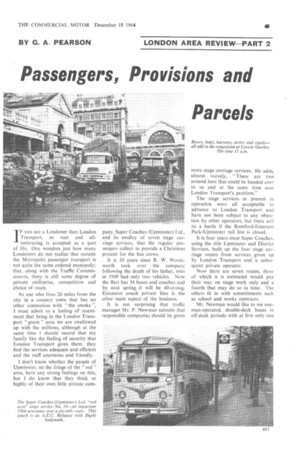
Page 46
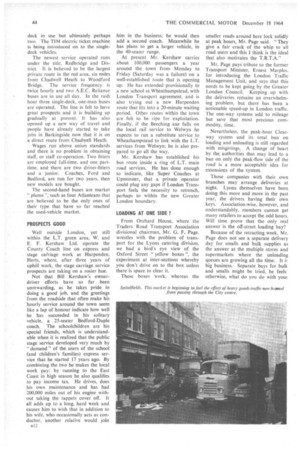
Page 47
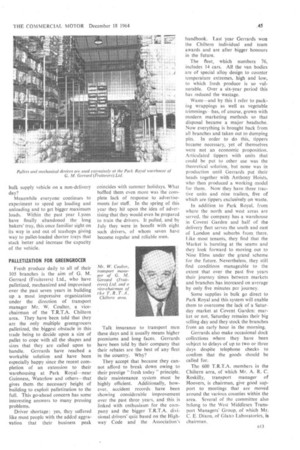
Page 48
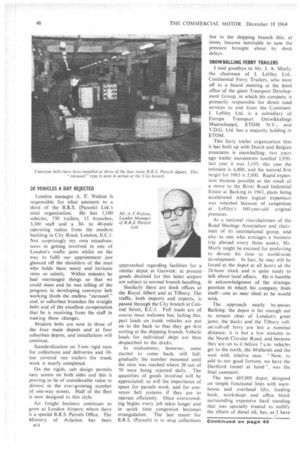
Page 51
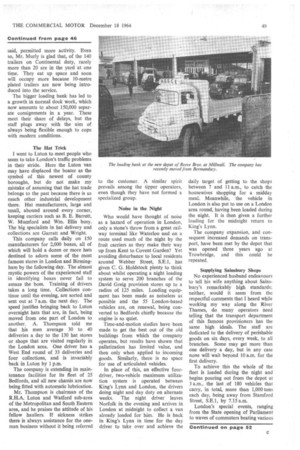
Page 54
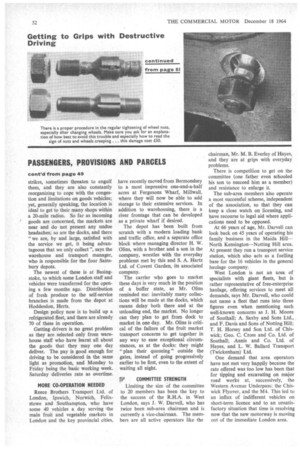
If you've noticed an error in this article please click here to report it so we can fix it.
IF you are a Londoner then London Transport, so vast and allembracing is accepted as a part of life. One wonders just how many Londoners do not realize that outside the Metropolis passenger transport is not quite the same ordered monopoly; that, along with the Traffic Commissioners, there is still some degree of private enterprise, competition and choice of route.
As one who lives 26 miles from the city in a country town that has no other connection with the smoke ", I must admit to a feeling of resentment that being in the London Transport "green " area we are swallowed up with the millions, although at the same time I should record that my family like the feeling of security that London Transport gives them; they find the services adequate and efficient and the staff courteous and friendly.
I don't know whether the people of Upminster, on the fringe of the "red " area, have any strong feelings on this,
but 1 do know that they think so highly of their own little private corn pany, Super Coaches (Upminster) I.td., and its medley of seven stage carriage services, that the regular passengers collect to provide a Christmas present for the bus crews.
It is 10 years since R. W. Wordsworth took over •the company following the death of his father, who in 1949 had only two vehicles. Now the fleet has 34 buses and coaches and by next spring it will be 40-strong. Extensive coach private hire is the other main aspect of the business.
It is not surprising that traffic manager Mr. P. Newman submits that responsible companies should be given
more stage carriage services. He adds, almost naïvely, "There are two around here that could be handed over to us and at the same time ease London Transport's problem."
The stage services at present in operation were all acceptable in advance to London Transport and have not been subject to any objection by other operators, but there will be a battle if the Romford-Emerson Park-Uptninster rail line is closed.
It is four years since Super Coaches. using the title Upminster and District Services, built up the four stage carriage routes from services given up by London Transport and a subsequent private operator.
Now there are seven routes, three of which it is estimated would pay their way on stage work only and a fourth that may do so in time. The others fit in with commitments such as school and works contracts.
Mr. Newman would like to see oneman-operated, double-deck buses in off-peak periods with at first only one deck in use but ultimately perhaps two, The TIM electric ticket machine is being introduced on to the singledeck vehicles.
The newest service operated runs under the title. Redbridge and District. It is believed to be the largest private route in the red area, six miles from Chadwell Heath to Woodford Bridge. The service frequency is twice hourly and two A.E.C. Reliance buses are in use all day. In the rush hour three single-deck, one-man buses are operated. The line is felt to have great prospects and it is building up gradually at present. It has also opened up a new way of travel and people have already started to take jobs in Barkingside now that it is on a direct route from Chadwell Heath.
Wages run above union standards and there is no problem in obtaining staff, or staff co-operation. Two fitters are employed full-time, and one parttime, and there are two driver-fitters and a junior. Coaches, Ford and Bedford, are run for two years, then new models are bought.
The second-hand buses are market "plums ",-such as four Atlanteans that are believed to be the only ones of their type that have so far reached the used-vehicle market.
PROSPECTS GOOD Well outside London, yet still within the L.T. green area, W. and E. F. Kershaw Ltd. operate the County Coach line on express and stage carriage work at Harpenden. Herts, where, after three years of uphill work, the stage carriage service prospects are taking on a rosier hue.
Not that Bill Kershaw's ownerdriver efforts have so far been unrewarding, as he takes pride in doing a good job, and the greetings from the roadside that often make his hourly service around the town seem like a lap of honour indicate how well he has succeeded in his solitary vehicle, a 25-seater Bedford-Duple coach. The schoolchildren arc his special friends, which is understandable when it is realized that the public stage service developed very much by "demand" of the users of the school (and children's families) express service that he started 17 years ago. By combining the two he makes the local work pay; by running to the East Coast in high season he also qualifies to pay income tax. He drives, does his own maintenance and has had 200,000 miles out of his engine without taking the tappets cover off. It all adds up to a long, hard week and causes him to wish that in addition to his wife, who occasionally acts as conductor, another relative would join 12 him in the business; he would then add a second coach. Meanwhile he has plans to get a larger vehicle, in the 40-seater range.
At present Mr. Kershaw carries about 100,000 passengers a year around the town from Monday to Friday (Saturday was a failure) on a well-established route that is opening up. He has extended provisionally to a new school at Wheatharnpstead, with London Transport agreement, and is also trying out a new Harpenden route that fits into a 20-minute waiting period. Other routes within the town are felt to be ripe for exploitation. Finally, if the Beeching axe falls on the local rail service to Welwyn he expects to run a substitute service to Wheathampstead to link with the L.T. services from Welwyn; he is also prepared to go all the way.
Mr. Kershaw has established his bus route inside a ring of L.T. main road services. He has done enough to indicate, like Super Coaches at Upminster, that a private operator could plug any gaps if London Transport feels the necessity to retrench, perhaps to within the new Greater London boundary.
LOADING AT ONE SIDE?
From Orchard House, where the Traders Road Transport Association divisional chairman, Mr. G. F. Page, wrestles with the problem of transport for the Lyons catering division, we had a bird's eye view of the Oxford Street "yellow boxes ", the experiment at inter-sections whereby you don't drive on to the box unless there is space to clear it.
These boxes work, whereas the smaller roads around here lock solidly at peak hours, Mr. Page said. They give a fair crack of the whip to all road users and this I think is the ideal that also motivates the T.R.T.A."
Mr. Page pays tribute to the former Transport Minister, Ernest Marples, for introducing the London Traffic Management Unit, and says that this needs to be kept going by the Greater London Council. Keeping up with the deliveries remains an overwhelming problem, but there has been a noticeable speed-up in London traffic. The one-way systems add to mileage but save that most precious commodity, time.
Nevertheless, the peak-hour Clearway system and its total ban on loading and unloading is still regarded with misgivings. A change of heart by the authorities that may lead to a ban on only the peak-flow side of the road is a more acceptable idea for extensions of the system.
Those companies with their own branches may arrange deliveries at night. Lyons themselves have been doing this more and more in the past year, the drivers having their own keys. Association-wise, however, and understandably, members cannot get many retailers to accept the odd hours. Will time prove that the only real answer is the off-street loading bay?
Because of the retracting week, Mr. Page does not see a separate delivery day for smalls and bulk supplies as the answer at the multiple stores and supermarkets where the unloading queues are growing all the time. It if big business. Separate bays for bulk and smalls might be tried, he feels: otherwise, what do you do with youi bulk supply vehicle on a non-delivery day?
Meanwhile everyone continues to experiment to speed up loading and unloading and to get bigger maximum loads. Within the past year Lyons have finally abandoned the long bakers' tray, this once familiar sight on its way in and out of teashops giving way to pallet-loaded shorter trays that stack better and increase the capacity of the vehicle.
PALLETIZATION FOR GREENGROCER
Fresh produce daily to all of their 105 branches is the aim of G. M. Gerrard (Fruiterers) Ltd., who have palletized, mechanized and improvised over the past seven years in building up a most impressive organization under the direction of transport manager Mr. W. Coulter, a vicechairman of the T.R.T.A. Chiltern area. They have been told that they are the only multiple greengrocers palletized, the biggest obstacle in this trade being to decide upon a size of pallet to cope with all the shapes and sizes that they are called upon to handle. Gerrards have reached a workable solution and have been especially happy since the recent completion of an extension to their warehousing at Park Royal—near Guinness, Waterlow and others—that gives them the necessary height of building to exploit palletization to the full. This go-ahead concern has some interesting answers to many pressing problems.
Driver shortage: yes, they suffered like most people with the added aggravation that their business peak coincides with summer holidays. What baffled them even more was the complete lack of response to advertisements for staff. In the spring of this year they hit upon the idea of advertising that they would even be prepared to train the drivers. It pulled, and by July they were in benefit with eight such drivers, of whom seven have become regular and reliable men.
Talk insurance to transport men these days and it usually means higher premiums and long faces. Gerrards have been told by their company that their rebates are the best of any'fleet in the country. Why?
They accept that because they cannot afford to break down owing to their prestige "fresh today" principle. their maintenance system must be highly efficient. Additionally, however, accident records have been showing considerable improvement over the past three years, and this is linked with enthusiasm for the company and the bigger T.R.T.A. divisional drivers' quiz based on the Highway Code and the Association's handbook. Last year Gerrards won the Chiltern individual and team awards and are after bigger honours in the future.
The fleet, which numbers 76, includes 14 cars. Alt the van bodies are of special alloy design to counter temperature extremes, high and low, to which fresh produce is so vulnerable. Over a six-year period this has reduced the wastage.
Waste--and by this l refer to packing wrappings as well as vegetable trimmings—has, of course, grown with modern marketing methods so that disposal became a major headache. Now everything is brought back from all branches and taken out to dumping pits. In order to do this, tippers became necessary, yet of themselves were not an economic proposition. Articulated tippers with units that could be put to other use was the theoretical solution, but none was in production until Gerrards put their heads together with Anthony Hoists, who then produced a working model for them. Now they have three tractive units and nine trailers, five of which are tippers exclusively on waste.
In addition to Park Royal, from where the north and west areas are served, the company has a warehouse in Covent Garden and half of the delivery fleet serves the south and east of London and suburbs from there. Like most tenants, they find that the Market is bursting at the seams and they look forward to moving out to Nine Elms under the grand scheme for the future. Nevertheless, they still find conditions manageable to the extent that over the past five years their journey times between markets and branches has increased on average by only five minutes per journey, Some supplies in bulk go direct to Park Royal and this system will enable them to overcome the lack of a Satur. day market at Covent Garden: market or not, Saturday remains their big selling day and they stock the branches from an early hour in the morning.
Gerrards also make occasional dock collections where they have been subject to delays of op to two or three days despite telephone checks to confirm that the goods should be called for.
The 600 T.R.T.A. members in the Chiltern area, of which Mr. A. R. C. Roskilly, transport manager of Hoovers, is chairman, give good support to meetings that are moved around the various counties within the area. Several of the committee also belong to the West Middlesex Transport Managers' Group, of which Mr. C. E. Dixon, of Glaxo Laboratories, is chairman.
20 VEHICLES A DAY REJECTED London manager A. F. Walton is responsible for what amounts to a third of the B.R.S. (Parcels) Ltd.'s total organization. He has 1,100 vehicles, 750 trailers, 15 branches, 3,300 staff and a 30to 40-mile operating radius from the modern building in City Road, London, E.C.1. Not surprisingly my own misadventures in getting involved in one of London's traffic jams whilst on the way to fulfil our appointment just glanced off the shoulders of the man who holds these many and intricate reins so calmly. Within minutes he had rearranged things so that we could meet and he was telling of the progress in developing conveyor belt working (both the endless "carousel" aneat suburban branches the straight belt) and of the excellent co-operation that he is receiving from the staff in making these changes.
Modern belts are now in three of the four main depots and at four suburban depots, and installations will continue.
Standardization on 5-ton rigid vans for collections and deliveries and 10ton covered van trailers for trunk work is nearly completed.
On the rigids, cab design permits easy access on both sides and this is proving to be of considerable value to drivers in the ever-growing number of one-way streets. Half of the fleet is now designed to this style.
Air freight business continues to grow at London Airport, where there is a special B.R.S. Parcels Office. The Ministry of Aviation has been B14 approached regarding facilities for a similar depot, at Gatwick; at present goods destined for this latter airport are subject to normal branch handling.
Similarly there are dock offices at the Royal Albert and at Tilbury. The traffic, both imports and exports, is passed through the City branch at Central Street, E.C.I. Full loads are of course most welcome but, failing this, part loads on trunk vehicles are put on to the back so that they get first sorting at the shipping branch. Vehicle loads for individual ships are then despatched to the docks.
In midsummer, however, some started to come back, still full: gradually the number mounted until the state was reached where 20 out of 70 were being rejected daily. The quantities of goods involved will be appreciated; so will the importance of space for parcels work, and for conveyor belt systems if they are to operate efficiently. Once overcrowding begins every job takes longer and in quick time congestion becomes strangulation. The last resort for B.R.S. (Parcels) is to stop collections but in the shipping branch this, at times, became inevitable to ease the pressure brought about by dock delays.
SNOWBALLING FERRY TRAILERS I said goodbye to Mr. J. A. Murly, the chairman of I. Leftley Ltd., Continental Ferry Trailers, who went off to a board meeting at the head office of the giant Transport Development Group, in which his company is primarily responsible for direct road services to and from the Continent. I. Leftley Ltd. is a subsidiary of Europa Transport Ontwikkelings Maatschappij, ETOM N.V., and T.D.G. Ltd. has a majority holding in ETOM.
This ferry trailer organization that it has built up with Dutch and Belgian associates is snowballing: two years ago trailer movements totalled 1,950; last year it was 3,195; this year the estimate is 4,400; and the natural first target for 1965 is 5,000. Rapid expansion became possible as the result of a move to the River Road Industrial Estate at Barking in 1963, plans being accelerated when logical expansion was retarded because of congestion at Leftley's 160-year-old original premises.
As a national vice-chairman of the Road Haulage Association and chairman of its international group, and also as one who averages a business trip abroad every three weeks, Mr. Murly might be excused for preferring to devote his time to world-wide development. In fact, he may still be found at the depot at all hours of the 24-hour clock and is quite ready to talk about local affairs. He is humble in acknowledgment of the strategic position in which his company finds itself—one as near ideal as he would wish.
The approach • neatly by-passes Barking; the depot is far enough out to remain clear of London's great jams; the docks and the Tilbury rollon/roll-off ferry are but a nominal distance; it is but a few minutes to the North Circular Road, and because they are on to it before 7 a.m. vehicles get to the north, the Midlands and the west with relative ease. "Now, to add to our good fortune, we have the Dartford tunnel at hand ", was the final comment.
The new £85,000 depot, designed on simple functional lines with warehouse and overhead lifts, loading bank, workshops and office block surrounding expensive hard standing that was specially treated to nullify the effects of diesel oil, has, as I have
said, permitted more activity. Even so, Mr. Murly is glad that, of the 140 trailers on Continental duty, rarely more than 20 are in the yard at one time. They eat up space and soon will occupy more because 10-metre plated trailers are now being introduced into the service.
The bigger loading bank has led to a growth in normal dock work, which now amounts to about 150,000 separate consignments in a year. These meet their share of delays, but the staff plugs away with the aim of always being flexible enough to cope with modern conditions.
The Hat Trick I went to Luton to meet people who seem to take London's traffic problems in their stride. Here the Luton van may have displaced the boater as the symbol of this newest of county boroughs, but do not make my mistake of assuming that the hat trade belongs to the past because there is so much other industrial development there. Hat manufacturers, large and small, abound around every corner, keeping carriers such as B. E. Barrett, W. Mumford and Wm. Ellis busy. The big specialists in hat delivery and collections are Garratt and Wright.
This company calls daily on 150 manufacturers for 2,000 boxes, all of which will hold a dozen or more hats destined to adorn some of the most famous stores in London and Birmingham by the following day. The almost mystic powers of the experienced staff in identifying boxes never fail to amaze the boss. Training of drivers takes a long time., ,Collections continue until the evening, are sorted and sent out at 7 a.m. the next day. The speed justifies bringing back to Luton overnight hats that are, in fact, being moved from one part of London to another. A. Thompson told me that his men average 30 to 40 deliveries a day to the 130 hat stores or shops that are visited regularly in the London area. One driver has a West End round of 33 deliveries and four collections, and is invariably back in Luton by 1 p.m.
The company is extending its maintenance facilities for its fleet of 25 Bedfords, and all new chassis are now being fitted with automatic lubrication.
Mr. Thompson is chairman of the R.H.A. Luton and Watford sub-area of the Metropolitan and South Eastern area, and he praises the attitude of his fellow hauliers. If sickness strikes there is always assistance for the oneman business without it being referred to the customer. A similar spirit prevails among the tipper operators, even though they have not formed a specialized group.
Noise in the Night Who would have thought of noise as a hazard of operation in London, only a stone's throw from a great railway terminal like Waterloo and on a route used much of the night by the fruit carriers as they make their way up from Kent to Covent Garden? Yet avoiding disturbance to local residents around Webber Street, S.E.1, has given C. G. Holdstock plenty to think about whilst operating a night loading system to serve 200 branches of the David Greig provision stores up to a radius of 125 miles. Loading equipment has been made as noiseless as possible and the 55 London-based vehicles are, on renewal, being converted to Bedfords chiefly because the engine is so quiet.
Time-and-motion studies have been made to get the best out of the old buildings from which the company operates, but results have shown that palletization has limited value, and then only when applied to incoming goods. Similarly, there is no space for use of articulated vehicles.
In place of this, an effective fourdriver, two-vehicle maximum utilization system is operated between King's Lynn and London, the drivers doing night and day duty on alternate weeks. The night driver leaves Norfolk in the evening and arrives in London at midnight to collect a van already loaded for him. He is back in King's Lynn in time for the day driver to take over and achieve the daily target of getting to the shops between 7 and 11 a.m., to catch the housewives shopping for a midday meal. Meanwhile, the vehicle in London is also put to use on a London area round, having been loaded during the night. It is then given a farther loading for the midnight return to King's Lynn.
The company expansion, and consequent increased demands on transport, have been met by the depot that was opened three years ago at Trowbridge, and this could be repeated.
Supplying Sainsbury Shops No experienced husband endeavours to tell his wife anything about Sainsbury's remarkably high standards; neither, would it seem from the respectful comments that I heard while working my way along the River Thames, do many operators need telling that the transport department of this famous provisioners has the same high ideals. The staff are dedicated to the delivery of perishable goods on six days, every week, to all branches. Some may get more than one delivery a day, but in any case none will wait beyond 10 a.m. for the first delivery.
To achieve this the whole of the fleet is loaded during the night and begins pouring out from the depot at 3 a.m.', the last of 180 vehicles that carry, in total, more than 1,000 tons each day, being away from Stamford Street, S.E.1, by 7.15 a.m.
London's special events, ranging from the State opening of Parliament to waves of commuters beating various strikes, sometimes threaten to engulf them, and they are also constantly reorganizing to cope with the congestion and limitations on goods vehicles; yet, generally speaking, the location is ideal to get to their many shops within a 20-mile radius. So far as incoming goods are concerned, the markets are near and do not present any undue headaches; so are the docks, and there "we are, by and large, satisfied with the service we get, it being advantageous that we only collect ", says the warehouse and transport manager, who is responsible for the four Sainsbury depots.
The newest of these is at Basingstoke, to which some London staff and vehicles were transferred for the opening a few months ago. Distribution of fresh produce to the self-service branches is made from the depot at Hoddesdon, Herts.
Design policy now is to build up a refrigerated fleet, and there are already 70 of these in operation.
Getting drivers is no great problem as they are selected only from warehouse staff who have learnt all about the goods that they may one day deliver. The pay is good enough for driving to be considered in the same light as promotion, and Monday to Friday being the basic working week. Saturday deliveries rate as overtime.
MORE CO-OPERATION NEEDED Reece Brothers Transport Ltd. of London, Ipswich, Norwich, Felixstowe and Southampton, who have some 40 vehicles a day serving the main fruit and vegetable markets in London and the key provincial cities, have recently moved from Bermondsey to a most impressive one-and-a-half acres at Fergusons Wharf, Millwall, where they will now be able to add storage to their extensive services. In addition to warehousing, there is a river frontage that can be developed as a private wharf if desired.
The depot has been built from scratch with a modern loading bank and traffic office, and a separate office block where managing director H. W. Olins, with a brother and a son in the company, wrestles with the everyday problems met by this and S. A. Hartz Ltd. of Covent Garden, its associated company.
The carrier who goes to market these days is very much in the position of a buffer state, as Mr. Olins reminded me: inevitably many collections will be made at the docks, which means delay both there and at the unloading end, the market. No longer can they plan to get from dock to market in one day. Mr. Olins is critical of the failure of the fruit market transport concerns to get together in any way to ease exceptional circumstances, as at the docks: they might "plan their queueing" outside the gates, instead of going progressively earlier to be first, even to the extent of waiting all night.
Pit COMMITTEE STRENGTH Limiting the size Of the committee to 20 members has been the key to the success of the R.H.A. in West London, says J. W. Darvell, who has twice been sub-area chairman and is currently a vice-chairman. The members are all active operators like the chairman, Mr. M. B. Everley of Hayes, and they are at grips with everyday. problems.
There is competition to get on the committee (one father even schooled his son to succeed him as a member) and resistance to enlarge it.
The sub-area members also operate a most successful scheme, independent of the association, so that they can keep a close watch on licensing, and have recourse to legal aid where applications need to be opposed.
At 66 years of age, Mr. Darvell can look back on 45 years of operating his family business in the Maida Hill— North Kensington—Notting Hill area. At present they run a transport service station, which also acts as a fuelling base for the 16 vehicles in the general haulage company.
West London is not an area of specialists with giant fleets, but is rather representative of free-enterprise haulage, offering services to meet all demands, says Mr. Darvell, who could not name a fleet that runs into three figures even when mentioning such well-known concerns as J. H. Moore of Southall; A. Saxby and Sons Ltd., and F. Davis and Sons Of Notting Hill; T. H. Horsey and Son Ltd. of Chiswick; Geo. C. Cross and Co. Ltd. of Southall; Annis and Co. Ltd. of Hayes, and L. W. Ballard Transport (Twickenham) Ltd.
One demand that area operators have not met very happily because the rate offered was too low has been that for tipping and excavating on major road works at, successively, the Western Avenue Underpass; the Chiswick Flyover, and the M4. This led to an influx of indifferent vehicles on short-term licence and to an unsatisfactory situation that time is resolving now that the new motorway is moving out of the immediate London area.








































































































